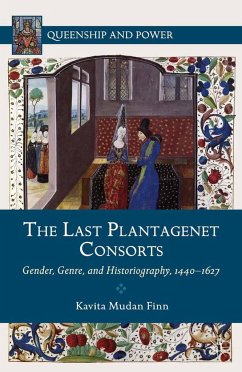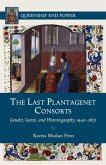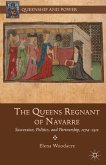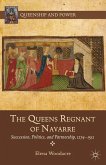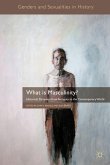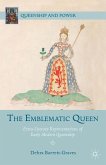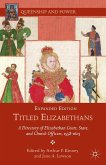"Finn's excellent study is one of the first of its kind to engage with early chronicle sources' complex depictions of historical royal women. Her lucid explanation of the influence of generic traditions of romance narratives and de casibus tragedy on historiography is a crucial piece of the puzzle that is the historical and literary representation of queenship, and her introduction of so many varied texts invites further investigation of this rich area of study." (Allison Machlis Meyer, English Studies, Vol. 97 (4), 2016)
"This book makes a significant contribution to the debate about defining female identity and will be of interest to, among others, scholars in English literature, drama, history, and gender studies. Utilizing a wide range of documents, Mudan Finn examines representations of the last Plantagenet consorts as a way of revealing authorial anxietiesand fears concerning these women's exercise of power." - Renaissance Quarterly
"The Last PlantagenetConsorts combines exhaustive research with a subtle and complex argument about historiography, female agency, and the power of narrative - topics that remain provocative and timely." - Journal of British Studies
"This book makes a significant contribution to the debate about defining female identity and will be of interest to, among others, scholars in English literature, drama, history, and gender studies. Utilizing a wide range of documents, Mudan Finn examines representations of the last Plantagenet consorts as a way of revealing authorial anxietiesand fears concerning these women's exercise of power." - Renaissance Quarterly
"The Last PlantagenetConsorts combines exhaustive research with a subtle and complex argument about historiography, female agency, and the power of narrative - topics that remain provocative and timely." - Journal of British Studies
"This book makes a significant contribution to the debate about defining female identity and will be of interest to, among others, scholars in English literature, drama, history, and gender studies. Utilizing a wide range of documents, Mudan Finn examines representations of the last Plantagenet consorts as a way of revealing authorial anxieties and fears concerning these women's exercise of power." - Renaissance Quarterly "The range and scope of the materials Kavita Mudan Finn analyzes is impressive, covering well-known historical texts, such as Vergil, More, Hall, and Holinshed, as well as less well-known works. The care with which she compares the ways in which the works under consideration emphasize inter-textual connections between the literature and history, heretofore unexamined in sufficient detail, is laudable, and the study will make a significant contribution to recent interest in defining female identity. By combining readings of historical perspectives with literary works, Mudan Finn is able to evoke an insightful examination of the last Plantagenet consorts, with emphases on female voices, rather than on male reactions to those voices. The book will appeal to a wide audience - those interested in literary, cultural, historical, and gender studies." - Debra Barrett-Graves, professor, Department of English, California State University, East Bay "The Last Plantagent Consorts takes its reader on a captivating journey that spans 150 years of narratives that represent, imagine, and reevaluate five fascinating queens: Margaret of Anjou, Cecily Neville, Elizabeth Woodville, Anne Neville, and Elizabeth of York. Finn's masterful scrutiny of the panoply of sources that depict these queens in a variety of generic incarnations is remarkable. On this journey exploring the ways in which female political agency is narrated - or narrates itself, Finn produces astute readings of some familiar historical and literary texts (such as various chronicles and Shakespeare's first tetralogy) and brings them in a dialog with lesser known and continental sources. The deeply interdisciplinary nature of this book will appeal to readers interested in history, politics, and literature alike. This is a truly encyclopedic study in its scope, its complex methodology, and its perspicacity." - Anna Riehl Bertolet, Associate Professor of English, Auburn University

